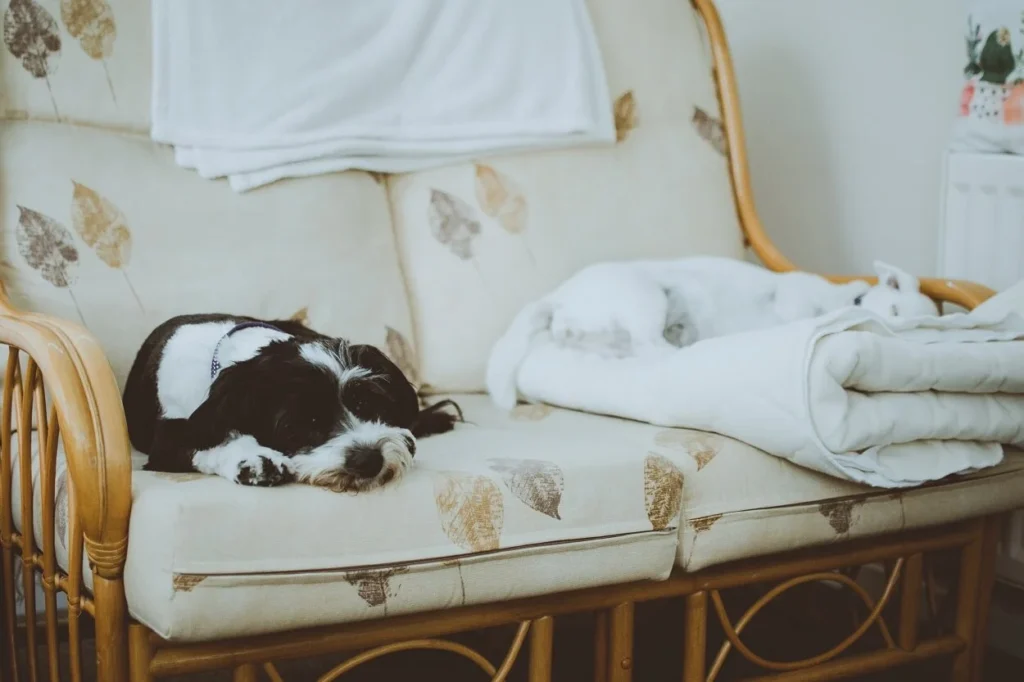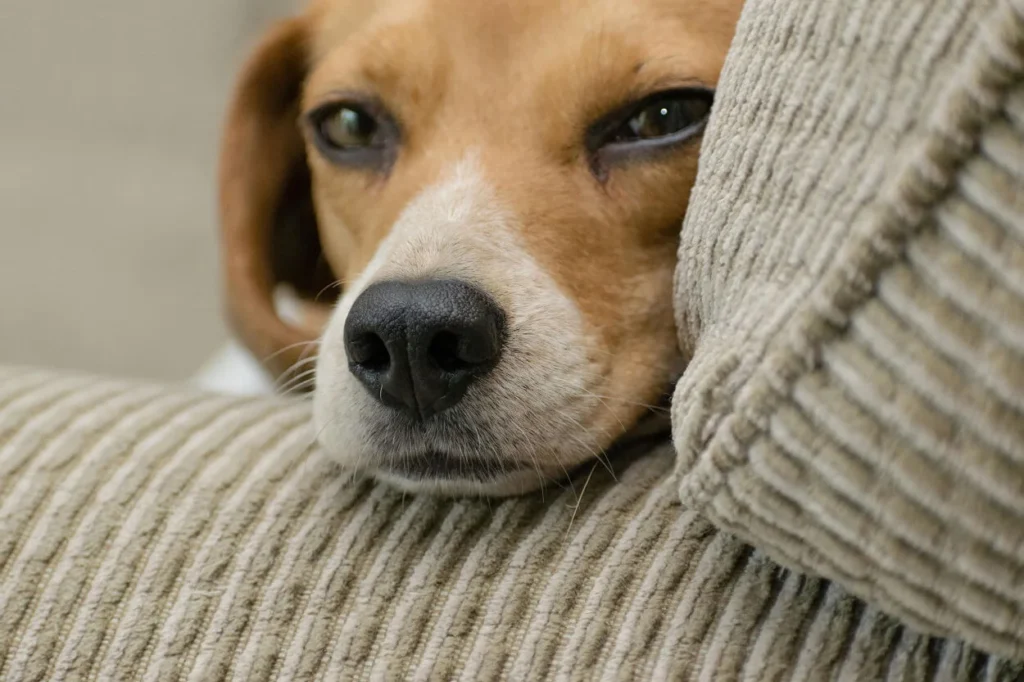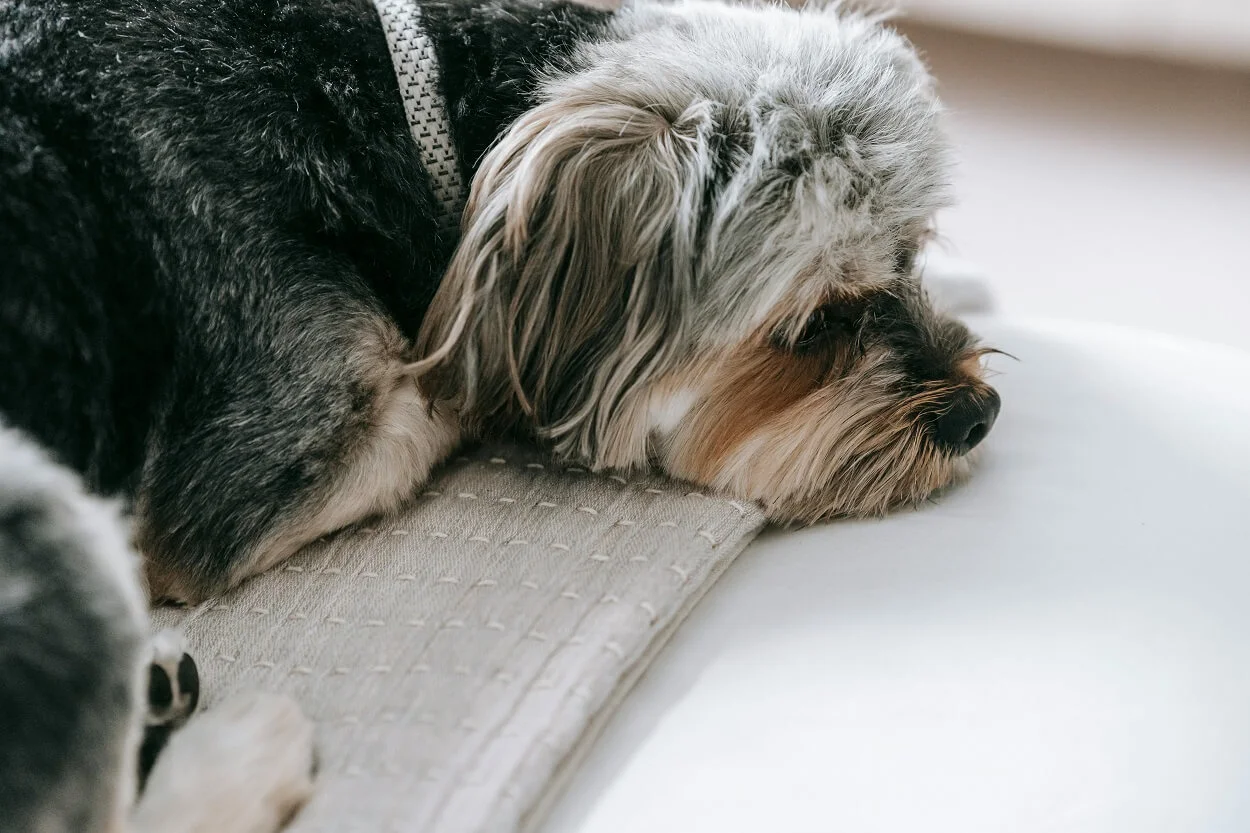You eagerly enter a room excited to spend some quality time with your beloved four-legged friend. Yet despite your enthusiastic calls for companionship, your canine companion quickly abandons their comfy bed to exit the room and isolate themselves elsewhere instead.
Why Does My Dog Sit Alone in Another Room? It happens due to protective instincts, sickness, anxiety, age, jealousy over new home additions and many more.
Why Does My Dog Sit Alone in Another Room?
An immediate sense of confusion emerges as you ponder why your furry pal rejects your company to seek solitude separated away in a different area of the home.
Did you unintentionally annoy them somehow? Does their voluntary withdrawal indicate an underlying health issue or emotional troubles troubling them? Before jumping to worrisome conjectures, better understand common motivations perfectly healthy dogs exhibit for periodically seeking out solitary spaces separated from their owners.
This article explains the top reasons behind dogs retreating to sit alone independently and tips addressing fundamental causes for their needs for periodic solitude.
16 Common Reasons Dogs Seek Solitude
Your Dog Feels Protective

Certain breeds like German Shepherds have been bred for generations to serve guarding and protection roles. This produces strong innate instincts to constantly patrol territory and remain alert for any threats to their family’s safety. They feel compelled to position themselves strategically monitoring entry points rather than relaxing idly if they sense potential danger.
All the necessary information in this article helps to understand Why Does My Dog Sit Alone in Another Room?
Vigilance takes priority over affection until a dog ensures all remains secure. If the family finally gathers safely in one room, the guarding dog may settle briefly. But when members spread out to isolated areas again, their protective watch duty resumes, exiting to keep surveilling the most vulnerable humans.
Your Anxious Dog Wants More Comfort
Like humans, anxious dog gravitate towards spaces offering the most physical ease and comfort amenities. Rooms with optimal ventilation, flooring that doesn’t irritate sore joints, access to fresh flowing water, pools of sunlight for napping and other features enhance livability for an anxious dog.
Without amenities like outdoor access or cushioned beds providing orthopedic relief, elderly, disabled or dogs with medical conditions will opt to spend most of their time in rooms best catered to their unique needs for comfort over rooms perceived as inconvenient.
Anxious Dog Needs Some Peace

Highly excitable events like children’s birthday parties or Super Bowl viewings generate loud noises, frenetic activity and constant disruptions that can overwhelm more introverted, timid dogs unaccustomed to ongoing chaos. Like some humans requiring quiet isolation to recharge mentally, dogs have sensory and socialization thresholds too.
When their limits get exhausted by extended noise and commotions in busy settings, they instinctively retreat to rooms offering relaxed quietude and calm until the frenzy subsides. The combination of television sounds and shouting blends with happy barking puppies playing too rambunctiously. The intensity necessitates periodic breaks.
Your Anxious Dog Seeks Calm
Dogs plagued by anxiety, phobias or insecurity inherently know to retreat and isolate themselves in windowless interior rooms, small spaces under furniture or inside closets during events triggering their fearful reactions like thunderstorms or fireworks. The perceived physical and auditory barriers of small enclosed dens help anxious dog feel more secure by providing deafening silence, warmth and camouflage.
Dogs requiring comforting confinement when ambient stress exceeds their resilience thresholds need designated safe spaces to mentally decompress in peaceful solitude or risk escalating psychological distress.
Your Unwell Dog Needs Rest
Physical illness or advancing age leaves some Anxious dogs lacking the mobility, strength and stamina to actively engage with typical playful antics and boisterous environments full of stimulation. Infections and conditions like Lyme Disease or arthritis also exacerbate overall fatigue exponentially faster compared to healthy canines, particularly with lively young puppies underfoot.
All these reasons tends to explore why does my dog sit alone in another room.
Miserable dogs isolate themselves in calm rooms to essentially hibernate undisturbed while attempting to sleep off discomfort and store the energy needed just to recover fundamental mobility. Any sustained hiding warrants evaluating other symptoms like appetite loss or limping issues.
Your Senior Dog Fatigues Faster
Just as older people require more frequent rests, senior dogs tire faster and more often as internal organ functionality, muscle mass, strength, and stamina decline with advancing age while existing joint or bone conditions like hip dysplasia also worsen over time.
Where they once played vigorously for hours, now middle-aged to elderly dogs may exploit all available energy reserves in less than an hour. Lower tolerance for noise and stressful commotion also encourages older anxious dogs to retreat to designated calm spaces where they can relax their aging bodies without getting accidentally injured by rambunctious pets.
Your Dog Lacks Social Skills
Inadequate socialization during critical developmental puppyhood phases sets the stage for poorly adjusted adult dogs lacking confidence around unfamiliar people, animals and new environments.
When confronted by too many guests or introduced to new dogs, under-socialized canines instinctively retreat due to feeling intensely uncertain and overwhelmed.
Timid body language and avoidance behaviors indicate these anxious dogs failed to learn appropriate social coping skills like polite greetings. Rehabilitation training builds lost sociability.
Your Dog Feels Jealous Of Another Pet

Some resident dogs habitually accustomed to exclusively monopolizing 100% of an owner’s time and affection suddenly find themselves displaced by the arrival of a new puppy requiring significant hands-on care or another foster dog joining the home.
The ensuing divided attention generates profound jealousy within certain dogs, sending them into isolation or prompting attention-grabbing misbehaviors. Rigorous reassurance and one-on-one affection, ideally involving the new rival as well, helps ease resulting envy and resentment issues triggered by shifting family dynamics over the adjustment phase.
Your Anxious Dog Needs Space From You
While most dogs relish and seek their owner’s companionship, others bred or conditioned to be more independent reach social saturation limits faster. After intense playtime or cuddling episodes, they require personal space bubbles allowing privacy and relaxation without stimulation.
Persistently “smothering” dogs communicating discomfort from excessive handling risks elevating their stress and anxiety exponentially over time as flight instincts activate with no escape. Letting these dogs self-isolate teaches respecting crucial consent concepts around bodily autonomy.
Your Curious Dog Is Exploring
Energetic young puppies embody endless curiosity. So when left alone loose in the house, they’ll inevitably wander room to room exploring everything through scent, taste and texture. Unlike crate-trained adult dogs conditioned to sitting still, puppies feel compelled to investigate small spaces like drawers, closets and laundry rooms.
Allow healthy investigative behaviors under supervision, redirecting chewing or bathroom urges appropriately. Make the room you occupy most enticing through treats, toys and bonding so curious pups learn to return voluntarily when play urges arise.
Your Dog Feels Depressed
Depression afflicts dogs too. Triggers like a beloved owner passing suddenly or dramatic routine upheavals from relocating away from family members into unfamiliar living situations trigger depressive symptoms. Affected dogs lose interest in once-adored toys and activities, experience appetite fluctuations and sleep excessively.
They isolate themselves, slumping in corners instead of seeking affection. Recovering depressed mood requires scheduling enriched activities, new toys and preventing self-isolation tendencies. Some cases benefit from antidepressant medication if underlying causes like genetics, trauma or seasonal SAD converge. Overall ensuring loving stability, patience and support aids wellness.
Your Dog Suffers Separation Anxiety
Dogs with diagnosed separation anxiety experience extreme distress when left home alone. Panic sets in, expressed through destructive chewing, indoor accidents, and barking.These anxious behaviors release stress, but also self-reinforce separation fears through negative associations. Afflicted dogs ultimately feel safest closely shadowing owners room to room rather than risk enduring solitary confinement. Consult a vet to explore management options if their extreme dependence prohibits normal life functioning.
Your Dog Seeks Preferred Temperature
A thick double-coated Chow prefers lounging on cool tile. A tiny Chihuahua nestles beside heating vents. Dogs relocate based on ideal comfort temperatures just like humans gravitate towards the thermostat level optimizing their relaxation. Ensure designated dog spaces offer seasonal heating or cooling so temperature-sensitive breeds need not choose between suffering hot or cold extremities versus abandoning their beloved security blankets — you!
Your Dog Is Avoiding Triggers
Dogs prone to reactivity, prey drive or fight impulse control challenges inherently avoid circumstances that test their fragile resilience if unaddressed through training. A dog reactive to visiting children dodges interacting by hiding downstairs. A former fighter won’t risk passing strange dogs on neighborhood walks. An obsessive chaser isolates during squirrel peak activity times. Preventing exposure eases their daily stress levels.
Your Dog Seeks Mental Stimulation
Highly intelligent breeds like Australian Shepherds thrive on near-constant interactive play, training challenges and noble toys preventing destructive boredom. When deprived of adequate mental engagement, they invent their own “jobs”…usually shredding objects while roaming room to unfamiliar room scoping for hidden toys or food they may have “misplaced.” Tire their minds through learning new commands regularly.
Your Dog Is Conflicted By Changes
Perpetual environmental changes induce stress as anxious dog struggle adapting quickly. Frequent parties, visiting relatives, room layout shuffling, kids bouncing between parent homes with pets and so forth exhaust the dog’s coping capacities, causing detachment. Import comfort items during moves. Limit guest numbers and altercations. Make their designated safe spaces consistency zones.
Conclusion
While sometimes puzzling when a beloved dog abandons treasured company suddenly to isolate themselves elsewhere, the behavior often links back to straightforward motivations around enhancing physical and emotional wellbeing in their own ways. Ensure your dog has access to designated rooms or partitioned areas offering genuine solitude whenever desired.
Beyond accommodating needs for periodic complete privacy, focus on optimizing your own company through an affectionate presence and room amenities offering essential comforts. Just take care not to force companionship on an introverted or anxious dog communicating persistent preferences for experiencing security mainly through peaceful alone time amid familiar spaces.
Now, the pet owners are able to understand clearly why does my dog sit alone in another room.

